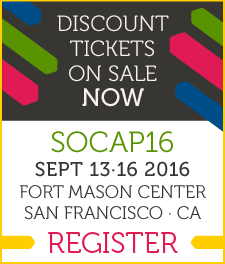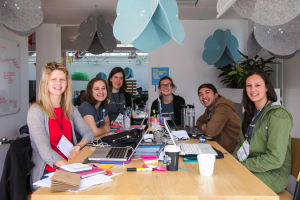A SOCAP guest post by Banks Benitez of Unreasonable Institute
“How do we scale this thing globally?” This was the question we circulated around the six- person Unreasonable Institute team in 2014. The Unreasonable Institute is an accelerator for entrepreneurs trying to solve the world’s most difficult challenges. We identify the world’s boldest, most innovative entrepreneurs and help them scale their businesses by providing intensive 6-week-long boot camps where entrepreneurs can connect with world-class mentors and investors. Every year we run one accelerator for 10-15 entrepreneurs, but there were thousands of other entrepreneurs from every corner of the world who were committed to solving major social and environmental problems. We were anxious to help more of them…hence the question: How do we scale this thing globally? How could a small organization with a small team and a small budget - based in a small office in Boulder, Colorado - go big?
We didn’t know how to scale, so we started talking to everyone. Experts, mentors, friends, our parents, and we eventually learned a very obvious lesson: there is no one right way to scale. And so we decided that we would learn how to scale…by scaling. We would just start trying and in the process, we’d eventually, maybe, if we were lucky, fingers crossed, figure it out. Here is what we did and what we learned:
What We Did
Because we didn’t know what we didn’t know, we were skeptical about developing a bold strategy before we eased our way into it. We’ve learned that strategy is best when done inductively, meaning when it grows organically out of what the market tells us. Rapid prototyping expert, Tom Chi, says something similar when it comes to strategy: “It’s quite difficult to do [strategy] outside of an experimental context that challenges/validates and constantly evolves and improves what constitutes the strategy.” That’s basically how we started to scale: created an experimental context that slowly is molding itself into a strategy (still to this day).
Instead of doing an exact replication of our model (6-week-long boot camps that require a 5-6-person full-time team), we decided to launch a one-week-long trial version, what we called an Unreasonable Lab, around the world in multiple countries simultaneously. An Unreasonable Lab was a miniature version of our full-scale accelerator, but it could be planned and executed within 3-4 months by a local team on the ground. Our plan was to find a strong local team with experience in entrepreneurship and acceleration, give them an “accelerator in a box” with all of our curriculum, resources, best-practices, and templates, provide omnipresent HQ support over Skype and Slack, and then set them loose to launch these “laboratories” of experimentation on how to scale.
The hypothesis was that Labs would serve as an important, and quick, bellwether of market readiness: what is the entrepreneurial ecosystem like? Are there enough entrepreneurs, mentors, investors, partners, etc.? Is the market untapped or saturated with accelerators? Most importantly, is the team we’re partnering with the right team to run longer Unreasonable programs in the future? Running multiple Labs would also give us more opportunities to “practice” scaling; we would be able to figure out what support local teams needed, what our value proposition was for these teams, and where our blind spots were.
Nearly two years later, we’ve launched 22 Labs in 16 countries in 6 continents, accelerating over 250 entrepreneurs. Some Labs have been truly extraordinary, better programs than we ourselves have ever run, and we’ve taken careful notes on what makes them so good. Other Labs have been utter failures and we’ve taken even more careful notes to understand the limitations of our support and our selection process. Some Labs are advancing to launch long-term, full-scale Unreasonable Institutes in their region, which was the goal all along.
We’re not there yet. We’re approaching the next frontier of unknowns about how to scale, but here are three key learnings that might help other ventures that want to scale but don’t know how.
What We Learned
- Optimize around rate of learning: Steve Blank says that “a startup is a temporary organization in search of a repeatable model.” Arriving at a repeatable model requires testing, learning, revising, and testing again. One question that was helpful for us: what are the biggest unknowns when it comes to scaling and how we can we design a quick, temporary experiment to validate/invalidate them?
- Pursue incrementalism: Hold loosely to assumptions and models and what’s worked in the past and tightly to a commitment to respond to what the market tells you. Steve Blank, again, says “No business plan survives first contact with customers.” One question that was helpful for us: Based on all of this learning from dozens of Labs around the world, what is the signal and what is the noise? What should we be paying attention to that can inform our next step and our future strategy?
- Get out of the way: For us, scaling meant determining where we were a bottleneck and where our greatest points of leverage were to equip other people to help us achieve our mission. This meant that we had to get out of the way. One question that was helpful for us: where are we in our own way when it comes to scaling? If we were to 10x our scale, what would need to change about our model?
We are still working to master the art of scaling, and to do that we’ve put learning at the the heart of our organization. To learn more, please reach out at UnreasonableInstitute.org.
Banks Benitez is the Senior Vice-President of Global Expansion at the Unreasonable Institute where he is charged with scaling the Unreasonable Institute around the world. In his four years at the Institute, he has played in a variety of different roles: from entrepreneur-recruiting and selection to managing the global mentor network to leading the curriculum design of the Institute to currently launching Unreasonable Labs, the experimental division of Unreasonable Institute that has scaled to 12 countries in 2015. Banks is a Colorado native, with a Bachelors in Economics from Vanderbilt University and a Masters of International Development from the University of Sydney in Australia.
Unreasonable Institute is a SOCAP16 Network Partner.




